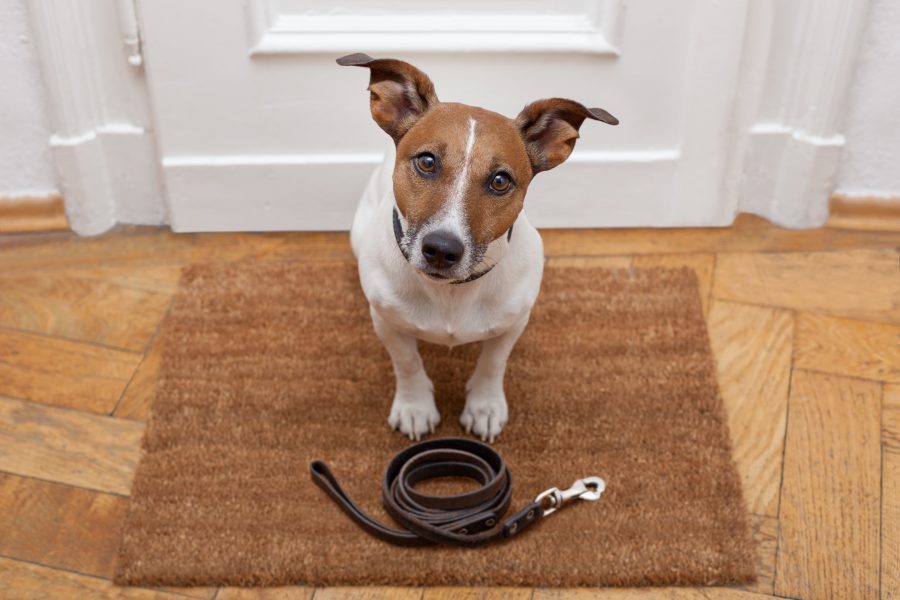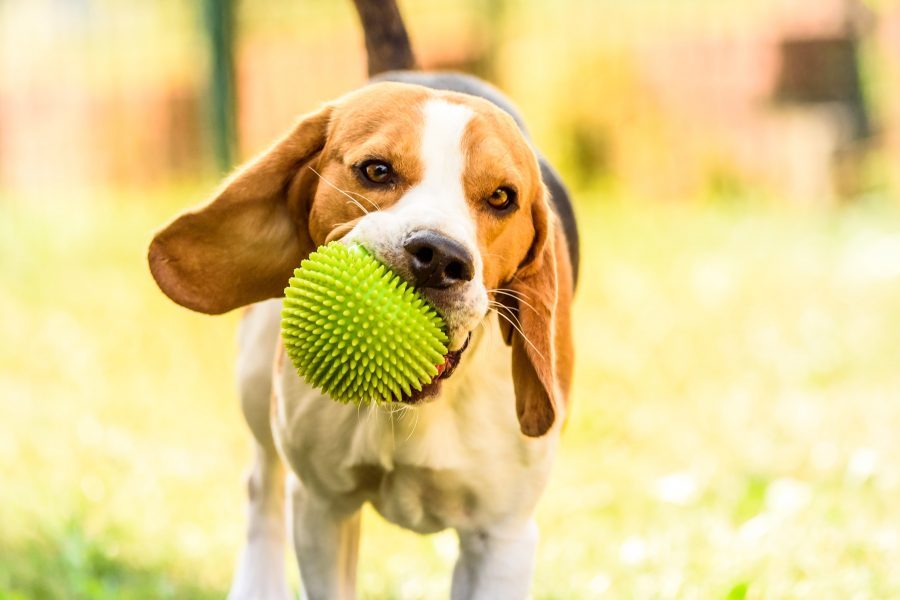Summer is a difficult season for dogs because it is the time when the owners go on holiday and can not always bring their puppy with them: this event often causes the dog separation anxiety.
In these situations you have to leave your dog at home alone or with a dog sitter – but what is the risk? Distancing yourself from your dog can cause abandonment anxiety in your pet, a very common condition that affects about 1 in 7 dogs.
A dog with separation anxiety suffers from excessive attachment to its owner: if you feel separation anxiety in your dog, what should you do? The problem can be solved by accustoming the puppy to the absence of the owners with some exercises or through natural remedies – such as specially designed calming agents.
Remedies for dog anxiety separation
Whether you’ve been on holiday or absent from home for a few hours, you might find your house upside down on your way back: this is what can happen if your pet suffers from separation anxiety. At this point you ask yourself how to treat it: the starting point is to gradually accustom the animal to the absence of the owners, both with exercises and with behavioral therapies. In the event of dog separation anxiety, remedies such as abandonment, besides being reprehensible gestures, are also illegal.
One of the main causes of this disease is the excessive attachment of the dog to the owner: especially in the first months of life of the puppy, giving disproportionate attention to their pet can lead to the development of a relationship of disproportionate dependence between pet and owner.
Spending time with your 4-legged friend, playing and walking with him, is correct, but limits must be set – otherwise the dog becomes insecure and constantly seeks contact with the owner, greatly increasing the risk of suffering from separation anxiety. Clearing and punishing the dog, even after a while, is not a valid solution to tackle this disease, because the animal does not understand the reason for the punishment, feeling even more disoriented and unconfident.

So, how to treat separation anxiety in dogs? To avoid the administration of sedatives, there are natural remedies that can relieve stress, so that the puppy reduces howls, yelps and destructive gestures that are among the most recognizable signs of suffering due to separation anxiety. For example, homeopathic treatments, such as the use of Bach Flowers, counteract the feeling of fear and bewilderment caused by loneliness. By administering a few drops of Bach Flowers, the dog prepares more serenely for the return of the master – without upsetting the home.
One solution to deal with separation anxiety is to interact as naturally as possible with the pet and avoid boredom. In fact, boredom also contributes to this disease: take your dog for an outdoor walk, play with him – but remember not to exaggerate, because your 4-legged friend could develop a sort of psychological subjection to you.
Self harm and dogs
In the case of separation anxiety, the dog behaves in a number of ways to express his suffering: not only does he make his discomfort explicit by barking, howling, destroying toys and furniture (scratching on the door, chewing on the sofas), but he also does his “business” around the house. These actions are not just spiteful, but a real cry for help from an animal that suffers and is looking for someone to calm him down.
However, the most extreme gesture during the absence of the owner is self-injury: dogs left alone get abrasions on the body due to excessive scratching or licking, in an almost hysterical way.
Because of the stress in the dog, self-injury of legs is the most frequent gesture: the pet chews in various parts of the body, hurting itself, especially on the legs. The frequent lesions in this area initially cause abrasions, but in the long term lead to loss of sensitivity to pain in the area, developing a real self-injury pathology that can become chronic.
In fact, these forms of self-injury can become chronic over time and occur as real nervous tics: since they are involuntary gestures, the dog will get hurt by itself, not only in case of abandonment, but also in company, with negative effects on his health. In this case we recommend the intervention of an expert who will help your 4-legged friend to overcome the difficulties through a specialized therapy.
And what if my dog destroys toys?
Another way in which the dog expresses his separation anxiety is by destroying everything within his paw’s reach: do you come home after a day’s work and find torn parts of the couch, broken toys and chewed-up or scattered clothing around the house? No, it’s not a spite of the puppy. The destruction of objects, in fact, is the favorite activity of dogs who feel lonely or bored: your pet behaves in this way because he feels neglected and, in doing so, thinks to draw your attention.
Before leaving your home, you must have thought of giving your pet some toys, so that he has something to have fun with in your absence. However, on your way back you will find that these objects have been broken, but you won’t understand why dogs destroy toys.
There can be many reasons behind this: sometimes they do because, unconsciously, you taught them to play like that or because, having them always at their disposal, those toys no longer provide stimulation to the puppy who, as a result, invents new ways to entertain himself. Nevertheless, such behaviour can hide more serious discomforts such as stress and separation anxiety.

You should also remember that dogs do not see toys as playthings, but as an outlet through which they vent all the discomfort caused by abandonment: it is not just a spit, but a way to reduce the stress and frustration that result from the constant search for contact with the owner. In other words, destroying furniture and toys is a rather obvious gesture that conceals a real discomfort in being alone.
Dog droppings: what they can mean
Another sign of separation anxiety is droppings, i.e. dogs doing their business in places where they shouldn’t be. So here, too, it’s not just the puppy’s spitefulness towards you.
Dumping around the house is an unintentional action made by dogs because of the detachment anxiety. Don’t be fooled by the apologetic look on your puppy’s face when you get home: the dog is not aware that he has done something bad, but he simply associates your return with punishment – especially if you have already tried to solve this problem in the past.
This “anticipation process” by which the dog shows to be submssive is related to the fact that he expects the master to punish him on his return. Punishment, however, is not the right solution, as it only increases the frustration of the animal, thus exacerbating the problem.
Other times, instead, puppies urinate when they are over-excited. Dogs suffering from separation anxiety welcome their owner with excessive enthusiasm by making a fuss of him: the huge joy of no longer being alone, however, can cause a loss of droplets.
Exercises to overcome dog separation anxiety
To treat dog separation anxiety, natural remedies such as homeopathic treatments are effective, but not sufficient. Puppies, in fact, must be used from an early age to being alone: they must establish a relationship of trust with the owner, without becoming overly dependent. Treating this disease is complex because it involves not only the pets, but the whole environment and the people surrounding them.
The following exercises can be helpful in treating abandonment anxiety:
- Leave him his spaces: from an early age, teach your 4-legged friend to be autonomous, avoiding morbid contact. Stay for a few hours in separate rooms, each respecting its own spaces;
- Avoid boredom: when you are together, do not leave your dog with anything to do, but take him for a walk in the park and play with him to let him vent all his energy. This way, he’ll be more calm at the time of detachment. Instead, when you have to leave your home, entertain the dog with toys that stimulate his intelligence and keep him busy, so that he does not notice your absence;
- Do not give the dog too much attention: before leaving, behave naturally with the dog, do not overdo with big show of affection that the pet can perceive as a sign that something is about to happen. Also, if he tries to jump all over you when you return, ignore him and greet him only after he has calmed down.
- Rest: avoid letting your dog sleep in your own bed – opt for a kennel or even put him in another room;
- Increase distances: try to ignore your dog half an hour before leaving your house and half an hour after returning home. Get your dog used to being alone by gradually increasing the detachment time;
- Fictitious exit rituals: desensitize your dog by making gestures that suggest that you are about to leave (i.e. pick up the keys and your bag, activate the alarm) without actually leaving;
- Command ” Stay!”: teach the puppy this command and gradually move away.
In addition, you can help your dog manage stress by enrolling him in training courses for abandonment anxiety. In this regard, there are specialized dog schools that will educate your 4-legged friend to live peacefully, even without constant contact with the owner.
